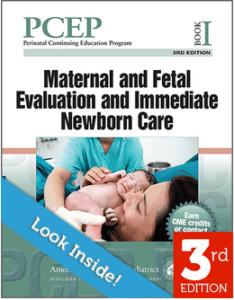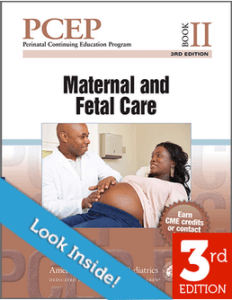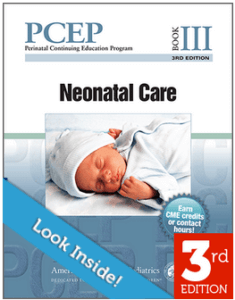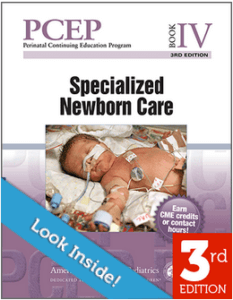PCEP Files
PLEASE SELECT FROM THE TABS TO ACCESS ADDITIONAL INFORMATION AND FILES.
About PCEP
Perinatal Continuing Education Program (PCEP) How Is PCEP Offered In Oklahoma?
As of July 2020, the Office of Perinatal Quality Improvement (OPQI) will no longer be facilitating the Perinatal Continuing Education Program (PCEP). The program is still available through the American Academy of Pediatrics (AAP) and OPQI encourages hospitals to continue utilizing the program to educate hospital staff and physicians every few years as a way to stay up to date on perinatal best practices and an opportunity to practice and validate skills.
The PCEP books may be ordered individually or as a package through the AAP at https://shop.aap.org/product-list/?q=pcep#sort=relevance&page=1&q=pcep
The comprehensive pre-test and post-test are no longer required, as this was part of the OPQI process to grant CNE. From this point forward, participants that want CME or ANCC continuing nursing education (CNE) can obtain them through the University of Virginia. Such participants will need to take the book exams online at https://med.virginia.edu/cme/learning/pcep/ and complete an online book evaluation for each book.
The cost of each PCEP book exam is $15 per book. The unit quizzes are free and can be taken multiple times. Book I: Maternal and Fetal Evaluation and Immediate Newborn Care, 14.5 CNE/CME Book II: Maternal and Fetal Care, 15.5 CNE/CME Book III: Neonatal Care, 16.5 CNE/CME Book IV: Specialized Newborn Care, 7.5 CNE/CME
Staff that do not want CNE do not need to take the online exams but should take the quizzes at the end of each unit to verify their knowledge of the content.
This new model for PCEP does not offer a coordinator workshop, but the OPQI staff remain committed to perinatal education in Oklahoma and to your clinicians. OPQI staff and physicians are available to provide presentations on a variety of perinatal topics to your clinicians upon your request. More about that forthcoming.
Program Effects:
- Cognitive knowledge increases for all participants
- Hospital perinatal-care equipment deficiencies decrease
- Elective patient care becomes more closely aligned with available resources
- Appropriate care practices increase
- Communication between disciplines and among care providers improves
Reasons for Success:
- Provides effective education; patient care improves
- Utilizes efficient implementation strategy
- Facilitates organizational change
- Provides useful tools for resource assessment, competency evaluation and risk reduction
- Is cost effective and efficient
- Allows advance budget planning
- Adapts to different users and locations
- Is well-accepted by participants
How Is PCEP Funded In Oklahoma? PCEP is partially funded by The University of Oklahoma Health Sciences Center Departments of OB/GYN and Pediatrics and participating hospitals.
PCEP Videos
Book I Content

Book I: Maternal and Fetal Evaluation and Immediate Newborn Care Book I features 8 units covering obstetric evaluation and Neonatal Resuscitation Program® information and skills, as well as units on thermal care and neonatal hypoglycemia. Contents include:
- Unit 1: Is the Mother Sick? Is the Fetus Sick? Skill Unit: Determining Fetal Presentation With Leopold Maneuvers
- Unit 2: Fetal Age, Growth, and Maturity
- Unit 3: Fetal Well-being
- Skill Unit: Electronic Fetal Monitoring
- Unit 4: Is the Baby Sick?
- Skill Units: Electronic Cardiorespiratory Monitoring, Pulse Oximetry
- Unit 5: Resuscitating the Newborn
- Skill Units:
- Management of Oxygen in the Delivery Setting
- Free-Flow Oxygen and Positive-Pressure Ventilation
- Endotracheal Intubation
- Chest Compressions
- Emergency Medications
- Apgar Score
- Skill Units:
- Unit 6: Gestational Age and Size and Associated Risk Factors
- Skill Unit: Estimating Gestational Age by Examination of a Newborn
- Unit 7: Thermal Environment
- Skill Units:
- Radiant Warmers
- Incubators and Neutral Thermal Environment
- Skill Units:
- Unit 8: Hypoglycemia
- Skill Unit: Blood Glucose Screening Tests
Book II Content

Book II: Maternal and Fetal Care Book II features 10 units containing information and skills essential for recognition and initial management of high-risk and sick pregnant women and their fetuses. Contents include:
- Unit 1: Hypertensive Disorders of Pregnancy
- Unit 2: Obstetric Hemorrhage
- Unit 3: Perinatal Infections
- Unit 4: Various High-risk Conditions
- Unit 5: Abnormal Glucose Tolerance
- Unit 6: Premature Rupture or Infection of the Amniotic Membranes
- Skill Unit: Sterile Speculum Examination Tests With Suspected or Proven Rupture of Membranes
- Unit 7: Preterm Labor
- Unit 8: Inducing and Augmenting Labor
- Unit 9: Abnormal Labor Progress and Difficult Deliveries
- Unit 10: Imminent Delivery and Preparation for Maternal/Fetal Transport
Book III Content

Book III: Neonatal Care Book III includes 10 units covering information and skills assessment and initial management of frequently encountered neonatal illnesses, plus the comprehensive unit review Is the Baby Sick?, which ties all neonatal therapies and skills together for management of sick and at-risk newborns. Contents include:
- Unit 1: Oxygen
- Skills Units:
- Administering Oxygen
- Measuring Oxygen Concentration
- Mixing Oxygen and Compressed Air
- Heating and Humidifying an Oxygen/Air Mixture
- Monitoring Oxygen
- Peripheral Arterial Blood Gas Sampling
- Skills Units:
- Unit 2: Respiratory Distress
- Part 1: Respiratory Distress
- Part 2: Apnea
- Part 3: Pneumothorax
- Skills Units:
- Detecting a Pneumothorax
- Transillumination
- Chest Radiograph Evaluation
- Treating a Pneumothorax
- Unit 3: Umbilical Catheters
- Skills Unit: Inserting and Managing Umbilical Catheters
- Unit 4: Low Blood Pressure
- Skills Unit: Measuring Blood Pressure
- Unit 5: Intravenous Therapy
- Skills Unit: Peripheral Intravenous Infusions
- Unit 6: Feeding
- Part 1: Feeding Principles
- Part 2: Tube Feeding
- Skills Unit: Nasogastric Tube Feedings
- Unit 7: Hyperbilirubinemia
- Unit 8: Infections
- Unit 9: Review: Is the Baby Sick? Identifying and Caring for Sick and At-Risk Babies
- Unit 10: Preparation for Neonatal Transport
Book IV Content

Book IV: Specialized Newborn Care Book IV includes 6 units dealing with complex neonatal therapies, such as assisted ventilation, as well as a unit on continuing care for at-risk babies and those with special problems following intensive care. Contents include:
- Unit 1: Direct Blood Pressure Measurement
- Skills Units: Transducer Blood Pressure Monitoring
- Unit 2: Exchange, Reduction, and Direct Transfusions
- Part 1: Respiratory Distress
- Skills Unit: Exchange Transfusions
- Unit 3: Continuous Positive Airway Pressure
- Skills Unit: Delivery of Continuous Positive Airway Pressure
- Unit 4: Assisted Ventilation With Mechanical Ventilators
- Skills Unit: Endotracheal Tubes
- Unit 5: Surfactant Therapy
- Skills Unit: Surfactant Administration
- Unit 6: Continuing Care for At-Risk Babies